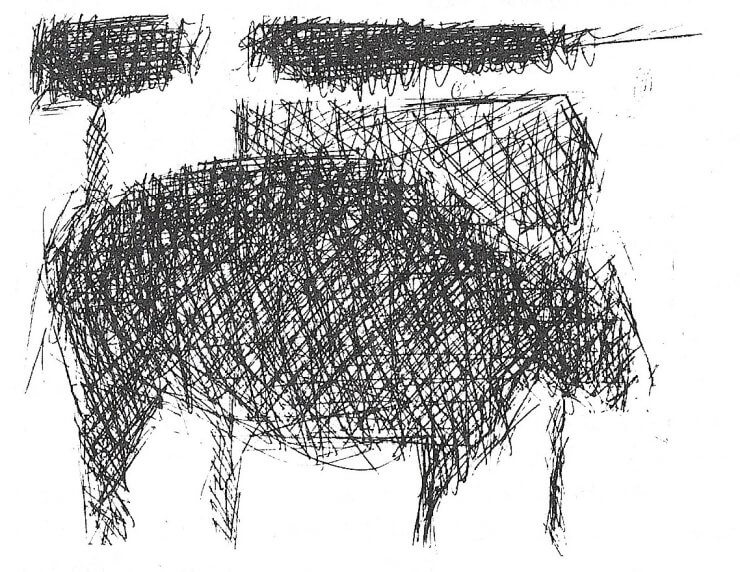Read by Michael Flamel

“Let’s open up the bidding at 800. Who’ll give me 8? gimme 8, gimme 8. C’mon, look at that udder, fellas. Looks like milk in the ring. 800. 8 and 1-half, now half, now half. 75. 75. 75 now 9! Lot of power in this cow. There’s a can a day in this one. 9. Gimme 9.”
For me, the hardest crop is carrots. First off, you have to plant such tiny seeds then keep them wet for weeks. I do that by covering them with boards or sheets. When they finally do sprout, you’ve got to uncover them quick. Later you’ve got to yank out bunches of husky weeds without disturbing the wispy starts you are after.
And I’ll tell you, it doesn’t help things when you check your two-inch seedlings one morning and find baseball-sized craters in the patch. When you find cowprints in the carrots.
“Look at those ribs showin’, boys. They ain’t pushed that one. Just put some groceries to her, that’s all she needs. Give you milk rich enough to stain a glass. Who’ll give me 11. 11 hundred. 11. 11. 11. 11? Sold for 10 hundred and fifty dollars. She’s Georgia bound.”
Just one pasture over from my garden, they’ve put up chairs, stage, and a barbeque stand. Spread cedar shavings to mask fresh manure. And begun selling off the herd. The Clarke’s dairy is shutting down. The auctioneer slams his gavel and pulls the cord that opens the gate. Ralph Brown, the farm milker, pushes in Buffy, a three-year-old holstein he raised, fed, and milked-from birth. His wife, Shirley, a woman whose entire home is a collection of bovine knick knacks, sits in the audience, puffy-eyed, to watch.
“Tip your hats, fellas, a lady just stepped into the room. A.I. sired and bred, just look at that seam up that rear udder. I’m going to start the bidding at 12 hundred on this one. Gimme 12, lemme hear, lemme hear, lemme hear. 12? 12! 12 and a half? 13!”
Last week, the cows got in my sweet corn. Three times. Chomped down half of the Silver Queen then tromped right through the carrots. Finally, I went down to the dairy barn, grabbed the barbed wire spool, and splinted the fence myself. Didn’t ask them to fix it. Not this time.
“The left udder’s just a little unbalanced on this one, boys, but just take her like you took your wife-for better or for worse. Who’ll give me six?” One at a time the herd is sold. 76 milking cows, 38 heifers, 27 calves. Then the corn choppers, the hay baler, even the winter’s crop of feed corn, still standing in the fields. In 8 hours, an entire farm, 6 decades old, is dismantled and scattered from Florida to Wisconsin. But, hey, it’s happening all over. Milk prices dropped 35%. Why not? When was the last time you went into a restaurant and ordered a glass of milk?
I leave the sale, go home, and try to unwind by doing a little gardening. But even here I can still hear it, a constant background murmur of the auctioneer’s voice. I fill the holes in my carrot patch and prop up all the stepped-on seedlings I can save. And all the while, I listen as someone pulls up a farm, piece by piece, by its roots. ❖


 Previous
Previous



Sad to hear and read this but it’s happening more and more now. I wish for the good old days to come back and they will never. To lighten this up, I did used to ride calves bareback and we went barefoot in Hawaii all of the time. When I got bucked off one day, my bare foot landed, yup, if you can imagine the squishing sound and goo getting in between yer toes, my right foot went into a fresh cow pat! Try explaining that to your Mom, except we were smart enough to go to the water hose first and never daring to try to make it to the bathroom, hopping all the way in on one foot!
????????